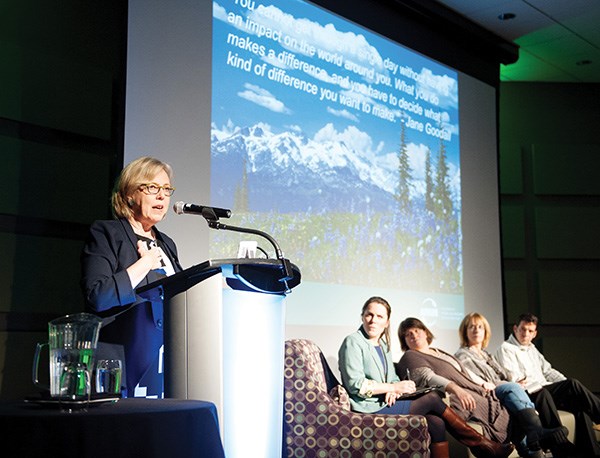Mayor Patricia Heintzman discussed Squamish’s green initiatives as one of the speakers at an event featuring Green leader Elizabeth May in Whistler last Thursday. The Whistler and Pemberton mayors also spoke at the Jan. 21 event, organized by the Association of Whistler Area Residents for the Environment (AWARE).
In her speech, May focused on the national and international implications of the global climate summit. While the Whistler event was to help local people understand what they could do to help curb global warming on a community level, May said the answers lie largely with government policy.
“We need to increase the carbon fuel tax,” the Green leader said. “It needs to cost more to ride around in a snowmobile.”
May said it needs to be convenient for people to act in an environmental way.
“A lot of people have to drive a car… for many reasons. If we make it about the personal, it’s really hard. We have to change the structure of society so it becomes easier – for example, tax rebates to buy hybrid or electric cars. We need to encourage that behaviour while discouraging the use and waste of fossil fuels.”
Overall, May said, a “very ambitious agenda” emerged from the recent global climate talks, during which Canada punched well above its weight.
“If we take them at their word, the leaders of 195 countries have just committed our society, our economies, all nations to go off fossil fuels completely as soon as possible,” May said. “We’ve committed to ensure that the global peak of greenhouse gas emissions is as soon as possible. There is speculation we may [have] hit it in 2015 and [will] go down from there.”
For its part, the B.C. government is in the midst of seeking input from residents for its new climate leadership plan, Jordan Sturdy, MLA for the West Vancouver-Sea to Sky, told the crowd. “A strong leadership plan will help us take advantage of a low-carbon economy, a future and green jobs,” he said.
Heintzman weighed in on Squamish’s environmental initiatives.
“We did it a 12-step action climate pledge back in 2006. This was before the province brought forward their climate strategy,” the Squamish mayor told the audience.
The district is making progress, she said. “Since 2011, we’ve reduced our operational carbon from 1231 tonnes to 803. We made a big jump when we started implementing curbside organic collection.”
“Our landfill, which is everybody’s waste in the corridor, produces about 14,000-plus tonnes of greenhouse gas a year. There’s lots of room to improve on that front,” she added.
Heintzman also noted that many “little things” can be done, such as using solar for crosswalks, making changes in buildings including the Brennan Park Recreation Centre.
The mayor praised the Squamish Climate Action Network. “I give them kudos. They’ve done an amazing job over the last couple years…. You need that advocacy to make government better.”
She also praised the Carbon Engineering facility on the waterfront that is scrubbing carbon from the air.
Squamish IN TALKS WITH UBC
The mayor said more changes are ahead for the Oceanfront development in Squamish. “Now we’re in talks with entities like UBC on how to use this for a hub – this was our key submission to the climate leadership plan of creating a hub of clean energy down at our oceanfront. We partnered with UBC on that, Bethel and Newport, the developer on the oceanfront, and Carbon Engineering, who’s doing this project.”
She called the talks “really exciting.” The Oceanfront plans have long included an educational facility, but no announcement has yet been made.
Heintzman also noted Squamish has many people who drive the highway each day for work.
“One of our biggest challenges in Squamish is we have way too many commuters,” she said, noting the district is “working hard at how do we ensure people aren’t commuting? Our goal is all these people in Squamish... aren’t commuting up to Whistler and aren’t commuting down to Vancouver.”



